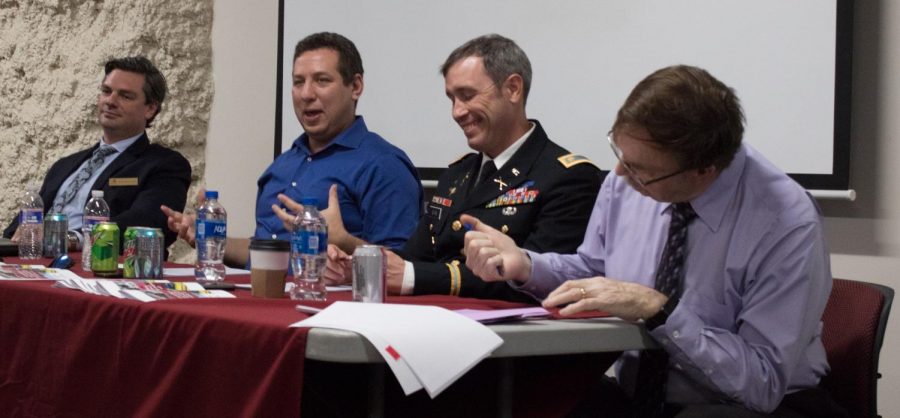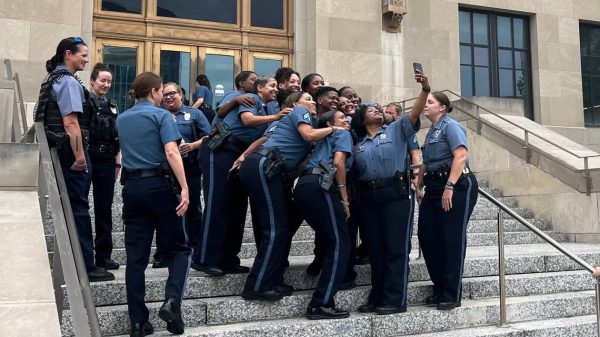Panel held to discuss geopolitics and defense spending
From left: Dr. Jack A. MacLennan, Dr. Jacob Stoil, Major Joe Evans, and Dr. Pete Schifferle held a panel to discuss defense spending and geopolitics
On Tuesday, April 24, during the 13th annual Student Research and Creative Arts Symposium, the Department of Political Science held a panel on defense spending and geopolitics. On the panel there were Park political science professor Dr. Jack A. MacLennan, Dr. Pete Schifferle, Dr. Jacob Stoil and Major Joel Evans, all from the School of Advanced Military Studies. The event was chaired by senior geography student Lendon Calhoun and moderated by Mason Godding, a senior political science major.
Schifferle, Stoil and Evans have personal experience with the United States military. MacLennan is Canadian born but specializes in international relations with a doctorate from Carleton University where he researched critical international relations theory and military intervention in the post-cold war world. The first question Godding asked the panel was if the $800 billion dollar military budget is justified.
“It’s a good deal what you get for 800 billion,” said Schifferle. “It provides international peace. We spend that money to control the commons. It buys us security.” The commons he is referring to are air, sea, space, and cyber.
“Yes, I do,” said Evans asked if the budget is justified. “If you look at the world today, I would argue that it has become increasingly more dangerous. We had a well-known enemy during the cold-war; Russia. We built our strategy and policy around that. Today you see similar threats with Russia and China but you also see things like terrorism and counter insurgencies. All this range of military conflict. So, the budget does give you a good buffer and range to stand and prepare for different things.”
Stoil was cagier with his answer.“The answer is yes and no. The question of how’re we spending it might be questionable,” he said. “We want our government and military to be efficient. When we make the federal government smaller, the money we save in personnel is spent on contracting. We want the military to be for war fighting and our soldiers looking like war fighters. Our search for efficiency makes us contract out a lot.”
“In the search for efficiency in our military we contract out a lot and make it less efficient,” Stoil continued. He went on to talk about his time as a contractor. If a person in the military was given an assignment, it was work until they completed it, he said. When they came to him as a contractor he gave them billable hours. He added they don’t just have to pay him, but also his bosses and overhead and costs.
“So then the military now has to do, in addition to its functions, it then has to do, oh! It now has to do farming,” Stoil said later. “It’s not just about the defense budget, it’s what’s not in everyone else’s budget.” He was referring to how the department of agriculture has had funding cut so during reconstruction of states after war, the military has to be the ones to teach how to farm.
MacLennan had a different perspective. “I’m going to talk about grand strategy. A political understanding of what we want our military to do what role they play vis-a-vis the international system,” MacLennan said. “I should point out that I share the idea outlined by people like Richard Haass that we live in a world of disarray.”
In the book “A World in Disarray,” Haass outlines why he believes that the world is, in his view in disarray. A lot of it has to do with the fact that the current global power dynamics are ahistorical. Throughout history, there are usually two major powers fighting against each other, therefore creating balance. MacLennan teaches a course on international relations and uses Haass’ book throughout the semester as a reference point.
“I contend that the United States has not had a grand strategy in quite some time,” MacLennan said. “A grand strategy is a conceptual roadmap that’s supposed to link how the state understands the international system to its role in that system so it can successfully arbitrate and understand that system.”
Godding then posed this question to the panel: “What is America doing?” He raises the question because America doesn’t seem to know what it’s doing with the budget or grand strategy.
“I’ll jump on that hand grenade,” Schifferle said. “What is the alternative? Have Russia, China, Iran or North Korea in charge?”
“As Americans we get to not care,” Stoil said. “And so we don’t really care what’s going on in UK domestically. We’re pretty much happy letting most countries do what they want to do. That’s not what you’re looking for if you’re Russia, Iran or China. We got what we want for our security, especially from our competitors. If you look at Russia and China, they don’t.”
Dr. Debra Sheffer, a Park University history professor, asked the panel if they thought as a country we’re desensitized to violence, despite how Americans claim to be peace loving.
Schifferle answered first saying he doesn’t think we’re so desensitized that “our love of freedom, independence, and the thought that our government works for us,” allows us to not be so fearful of jumping into wars.
“We have a volunteer military,” Stoil said. “We are relatively divorced from our military. The more the military is volunteer, the easier it is for us to push the button to start a war.”
“The US has an odd political culture where we are moved by martial virtue and human rights. These don’t go together,” MacLennan said.
“I do think we have a culture of violence,” Evans said. “This country was born in violence. I do think we have a fascination with violence.”
The event was a great chance for political science and history junkies to see different perspectives on how the US budgets our military and how Americans view war.
Your donation will support the student journalists of Park University. Your contribution will allow us to cover our annual website hosting costs, freeing up other funds for equipment, printing and training.









